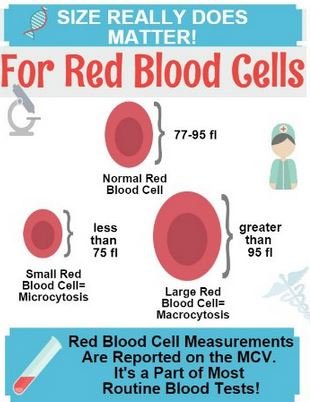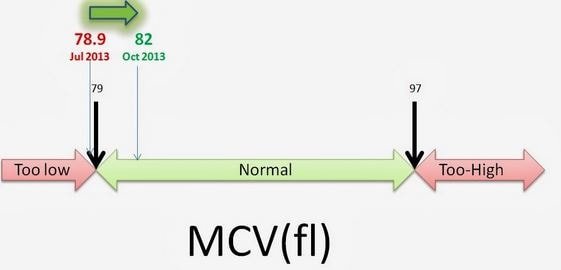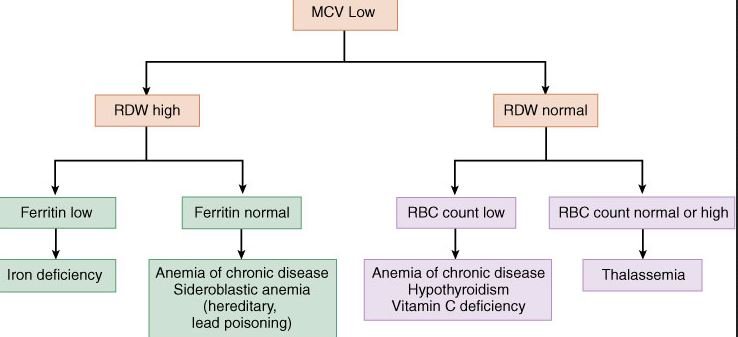MCV Blood Test
What is MCV in blood test?
This test is one of the assessment used to conduct as a part complete blood count (CBC). Evaluation of MCV blood test helps to estimate average space engaged with erythrocytes in total blood.

The value of MCV expresses in femtoliters (fl, or 10-15L). The value of MCV depends on the size of the erythrocytes (RBC). The value is decreased or increased with changes of the erythrocyte size. Iron, folic acid and vitamin B12 are essential for development of erythrocyte, Deficiency of these affect the MCV value. Deficiency of folic acid and vitamin B12 also not only hamper the erythrocytes volume in the blood, but also causes nerve disorders, metabolic disorders and digestive disorders.
MCV value is also depends upon other factors measure in CBC such as MCH. Generally MCV value is estimated along with MCH (mean corpuscular hemoglobin) (1,2,3)
What does MCV mean in a blood test?
MCV is a clinical abbreviation for mean corpuscle volume refers to the average erythrocyte volume in the blood sample. (2)
Normal values
MCV expressed in femtoliters (fl, or 10-15L) or cubic micrometer (µm3). Different methods are used to measure MCV. An automated hematology analyzer is the medical instrument used for direct measurement of MCV or it can be calculated from hematocrit (Hct) estimation. Otherwise MCV can be calculated from red blood cell count.

The usual considerable normal value of MCV 87.0 to 92.0 cubic micrometer, but usually every laboratory test report enlists the normal value, as this may vary with method followed for estimation of MCV.
- The normal value of MCV varies with age and is expressed in a range. For newborn babies, the MCV is in between the range of 95 to 121 µm3.
- For young adults, just above 18 years of age has MCV in between 78 to 98 µm3, but this value varies with gender. This value is lower in girls and MCV lies in between 78 to 102 µm3, (2,4)
Abnormal value of MCV
MCV value may differ from normal limit with certain disease conditions, it may increase or decreased than the normal. In every case, the abnormality occurs due to several health issues. The increased value of MCV indicates in following disorders
MCV blood test low

The decreased value of MCV indicates in following disorders:
- Deficiency of iron, which may occur due to nutritional inadequacy, hemorrhage, nutritional absorption disorders, invade of parasites.
- Deficiency of Copper
- Digestive disorder due to hypochlorhydria, means low content of hydrochloric acid in the stomach
- Deficiency of vitamin B6
- Insufficiency of vitamin C
- Rheumatoid arthritis.
- Genetic disorders like sideroblastic and thalassemias.
- Toxic effect of lead.
- Surgical removal of spleen.
- Hemolytic anemia (1)
MCV blood test high
- Anemia due to genetic disorder
- Megaloblastic anemia is develop due to lack of vitamin B12 or folic acid. These help to maturation of RBCs.
- Acute hemorrhagic conditions leads to Immature RBCs are larger in size in comparison to mature RBCs due to presence of reticulocytes
- Hepatic disorder
- Insufficiency of thyroid hormone or hypothyroidism
- Adverse effect of certain drug, including anti-convulsants and AIDS treating disease like Zidovidune.
References
- Jeremy E. Kaslow, (2016), Red Blood Cell count (RBC), Retrieve from: http://www.drkaslow.com/html/blood_cell_counts.html
- Choladda Vejabhuti Curry (2015); Mean Corpuscular Volume (MCV); Retrieve from: http://emedicine.medscape.com/article/2085770-overview#a2
- Blood cell indices> MCV and MCHC; Retrieve from: http://www.medicine.mcgill.ca/physio/vlab/bloodlab/mcv-mchc_n.htm
- MEAN CORPUSCULAR VOLUME; Retrieve from: http://www.medfriendly.com/mean-corpuscular-volume.html
